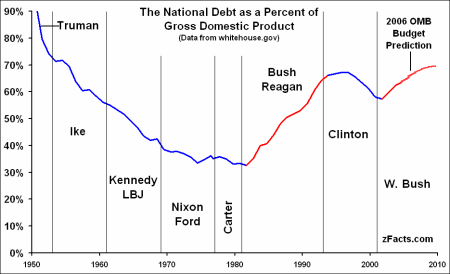Flat Tax
This post may be the first in a series dedicated to debunking the myth that a flat tax is a good idea. (I say "may be" because I'm not sure how dedicated I really am to this project.) I know this has been done thoroughly elsewhere, but I'd just like to try to explain it to myself in a way that people like me, i.e., people who are willing to think and yet know very little about economics, can understand.
Before I get to that topic, let me make two interrelated observations.
1. The tax code has become less progressive over the past 30 years. [The definition of a "progressive tax" as defined by Greg Mankiw, author of a standard economics textbook and former chairman of President Bush's Council of Economic Advisers, is as follows: "one for which high-income taxpayers pay a larger fraction of their income than do low-income taxpayers."] For the specific data regarding this trend, see Piketty, Thomas and Emmanuel Saez. "Income Inequality In The United States, 1913-1998," Quarterly Journal of Economics, 2003, v118 (1,Feb), 1-39. As Duncan Black summarizes here,

Conclusion: The administrations that implement the least progressive tax policy (Reagan, Bush I, and Bush II) produce increases in national debt as a percentage of our GDP. Since a flat tax is the absolute endpoint in abolishing a progressive tax policy, it stands to reason that we could expect an even larger percentage of our GDP dedicated to servicing national debt if we had a flat tax.
What this means: If we opt for a flat tax, we will likely increase our national debt as a percentage of the GDP. If that happens, we will be forced to spend more of our public funds on interest accrued from that debt. Thus, we will have to make major cuts in the other three major areas of federal spending: defense, social security, or health care. (Any other area would be a drop in the bucket by comparison.) Since we are unlikely to make major cuts in these areas, a flat tax will simply be a tax shift to future generations when taxes will inevitably have to be raised.
Before I get to that topic, let me make two interrelated observations.
1. The tax code has become less progressive over the past 30 years. [The definition of a "progressive tax" as defined by Greg Mankiw, author of a standard economics textbook and former chairman of President Bush's Council of Economic Advisers, is as follows: "one for which high-income taxpayers pay a larger fraction of their income than do low-income taxpayers."] For the specific data regarding this trend, see Piketty, Thomas and Emmanuel Saez. "Income Inequality In The United States, 1913-1998," Quarterly Journal of Economics, 2003, v118 (1,Feb), 1-39. As Duncan Black summarizes here,
In 1979, the top 0.1 percent of taxpayers earned 2.01 percent of total U.S. income; in 1999, they earned 6.63 percent. This group's share of total income more than tripled, while its share of federal taxes paid only increased by a little more than double. Similarly, in 1979, the richest 5 percent of taxpayers earned 20.83 percent of all income; in 1999, they earned 30.91 percent. This group's share of total earnings increased by about 50 percent, while its share of federal taxes rose only about 21 percent.2. The following chart (via Mark Thoma) shows the percentage of national debt as a share of our Gross Domestic Product. (See the Whitehouse website here to verify the data.) Notice the red part of the line.

Conclusion: The administrations that implement the least progressive tax policy (Reagan, Bush I, and Bush II) produce increases in national debt as a percentage of our GDP. Since a flat tax is the absolute endpoint in abolishing a progressive tax policy, it stands to reason that we could expect an even larger percentage of our GDP dedicated to servicing national debt if we had a flat tax.
What this means: If we opt for a flat tax, we will likely increase our national debt as a percentage of the GDP. If that happens, we will be forced to spend more of our public funds on interest accrued from that debt. Thus, we will have to make major cuts in the other three major areas of federal spending: defense, social security, or health care. (Any other area would be a drop in the bucket by comparison.) Since we are unlikely to make major cuts in these areas, a flat tax will simply be a tax shift to future generations when taxes will inevitably have to be raised.

0 Comments:
Post a Comment
<< Home